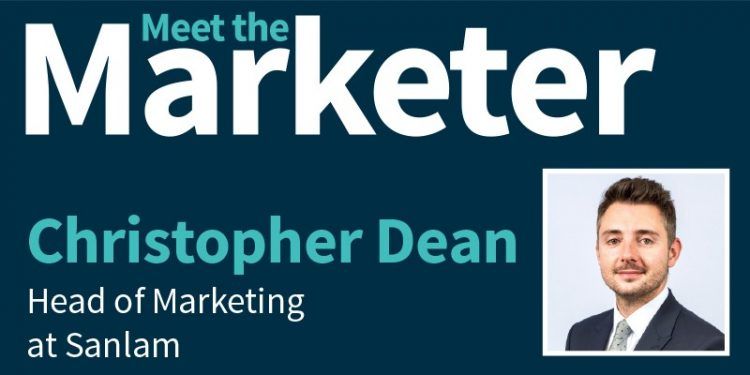In this month’s Meet the Marketer we talk to Christopher Dean, Head of Marketing at Sanlam about (among other things) finding the balance between creativity and proving effectiveness.
Please introduce yourself
I’m Christopher Dean, a committed marketer with a passion for brands.
What is your career history?
I started my career in a small PR agency and worked with clients in the road surfacing and aggregate sectors. Once you’ve written articles about the joys of asphalt you can write copy on just about anything! Following that I worked for a trade association, another PR agency and finally ended up in wealth and investment management in 2010 when I became Head of Communications at Rathbones. I joined Sanlam UK almost six years later and have been fascinated by just how much the industry – and the expectations of its customers – has changed in such a short period of time.
Why marketing?
As a teenager I was interested in politics and went on to study it at university, so I always thought I would go into lobbying or – dare I say it – become an MP. I then studied marketing as part of a postgraduate MSc business and I enjoyed understanding the tactics firms use to promote themselves and just how much of it taps into modern-day psychology. In many ways, the process of developing a product or a service, thinking about the key messages and where it fits in the market is not so different to politics.
What excites you about the future of Financial Services?
I’m excited that people are becoming more engaged with their money and the wave of innovation this is driving. I often hear friends talking about how they “love” their new current account provider or how an investment app they have downloaded is “brilliant”. That’s got to be a good thing and presents marketers with a huge opportunity to completely reshape the way people think about their money.
What worries you about the future of Financial Services?
Marketing in financial services is increasingly becoming about MI, ROI and conversion rates. While these are absolutely key to developing and executing successful marketing programmes, there is a danger they take precedence over creativity, intuition and emotional intelligence. Someone once described this to me as the ‘wind tunnel effect’. The fact that in a wind tunnel, motor cars perform in exactly the same way because they are, in essence, designed by computer. But what differentiates them is the way they are marketed. Think of any memorable marketing campaign or successful promotion and the chances are it’s been driven just as much by creativity and originality as it has by data. Financial services marketing has to be a balance of the two.
What’s the best advice you have ever received?
Anyone who knows me knows I’m a huge fan of the 1960s period drama, Mad Men, so it’s fitting that the best advice came from Don Draper. He said, “Advertising is based on one thing: happiness. And do you know what happiness is? Happiness is the smell of a new car. It’s freedom from fear. It’s a billboard on the side of a road that screams with reassurance that whatever you’re doing is OK. You are OK.” Sometimes we forget that people ultimately want to be happy and reassured. If we can achieve this through our products and services and the way they are communicated, then we’ll
create successful businesses with loyal customers.
What advice would you give a marketer starting out today?
Don’t think of marketing as simply administering a process. Marketing is something seen, felt, touched, watched, bought and experienced by people – actual real living breathing people. It’s too easy to get caught-up in the day-to-day activity and debate around a new product, service or campaign without asking: “will customers like it?”
If you could have any mentor, who would it be?
There are lots but I’m fascinated by the work of William (Bill) Bernbach, one of the founders of the so-called “creative revolution” and the man who oversaw the now iconic VW Beetle Think Small and Lemon adverts of the 1950s and 1960s. Now seen as one of the greatest campaigns of the 20th Century, this was a man who believed in being honest in the way products and services were promoted and trusting the customer to think for themselves. Not only did he successfully promote the VW Beetle to a skeptical US public, he also turned its perceived weaknesses into strengths and managed to tap into a resentment among US consumers about always having to have the latest model. Bernbach is also credited with the line, “Nothing makes a bad product fail faster than a great advertising campaign”, something which remains true today.
What’s the key marketing skill you will be developing over the next few years?
Without doubt my digital marketing skills. One way or another, every part of the customer experience is impacted by new technology, and firms in all sectors are becoming more aggressive in the digital space. It’s an essential part of any marketer’s armory.
What lessons could financial marketers learn from other sectors?
Financial marketers need to be better at understanding the needs of their customers, not just at one point in time, but throughout their lives. FMCG firms are great at this. It’s amazing to think that the Clubcard was first conceived in 1993 as a way for Tesco to reward and better understand it’s customers. Over 25 years later and financial services still struggles to understand what people want and when they want it, despite the fact it’s commonplace in so many other parts of our lives.

